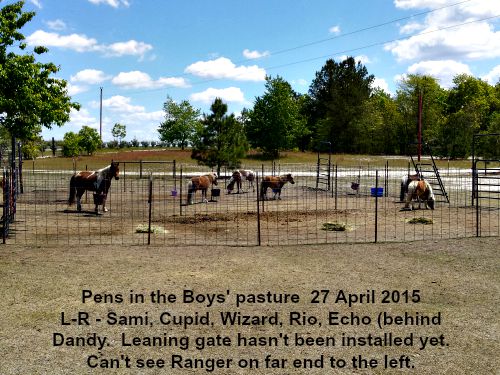LOL well AngC wander off into Google land some more and you'll learn that pesticides (insecticides, fungicides, herbicides) are everywhere. Even those who only feed hay, grass, and water are subject to them.
Searching on the internet is frustrating for me. Media often pick one little part of a topic and write a provocative headline, which is then picked up by the aggregators, each one parroting the other, then some media folks throw in their own spin, that they (seems to me) simply make up. I guess I could throw my hands in the air and bow to the inevitable that pesticides are everywhere and just give up. But, I'm not quite ready to give up yet. I'd like to try and educate myself.
I would like to clarify....
I have no interest in packaged/bagged horse feed and no axe to grind on this topic. I was reading about herbicides in Purina feed totally by accident. I don't feed their product or any bagged product. I was reading about compost, because this was the first year I decided to throw horse manure out in our veggie garden; plus we threw about 15 buckets of cedar needles in the same garden area, because they appeared to be messing with Nicky's navigation. I was concerned we'd overdone it in that section of our garden. So I was reading online about compost. I totally stumbled across the topic of
KILLER COMPOST!!!! I don't know about you all, but that one kind of grabbed my attention. And it took a whole bunch of searching to find two sources that seemed reputable. Long story short, some herbicides pass through the horse, coupled with certain composting methods, small amounts of herbicides in the manure in compost can stunt vegetable plants. If I'm going to spend a growing season on weed control, I don't want to end up with stunted veggies. This apparently first occurred in 2012. The actual effect seems legit to me--curled leaves, stunted vegetables. ... photos aplenty on-line. ...happened in multiples states. The one state where I could find lab results was Vermont. They lab-tested a few rounds ending with a round-robin with 6/7 labs involved. The results were non-repeatable; some labs detected herbicides that weren't registered for use or had no record of being used. And I'm not entirely sure whether the Purina feed was analyzed in
one or
two sets of testing. Additionally the amounts found in the Purina feed were well below government required standards. Probably ok for the horse. ...not so good for the veggies. I checked back today; three years later, the Vermont compost facility still doesn't accept horse manure. I wonder what the Vermont horse facilities are doing with their poop. Based on the tests, it's just my opinion, but I think they got a raw deal.
That said.... One of the most difficult things I've found as a newbie horse owner is the feeding. I would truly love to discuss various feeding problems with someone/anyone. Unfortunately, some horse owners appear to be sensitive. I realize I've wandered off-topic, but when someone comments that I'm belittling things I don't agree with, it flamber-ghasts me.(I made that word up.) It appears to me, that if I don't toe the company line, I ought to be drummed out of the county. If I don't nod in agreement, then that's the end of the discussion? What sort of discussion/exchange of ideas is that?
Edited-to-Add: I checked my yogurt cartons; one lists the actual types. And thank you, you gave me some ideas. I don't think I'll try to make yogurt though; I'd probably make some sort of smelly mess or poison myself. I'm not convinced on the benefits. I think there's promising research, but it's not there yet.






